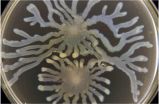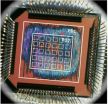ASD is among the most common form of severe developmental disability with prevalence rates up to 1 in 88 children. Boys are greater than four times more likely to be diagnosed with ASD, while recurrence risks for the sibling of a child with ASD are estimated at 18.7%. Since multiple studies have shown that early assessment and intervention offer significantly improved long-term outcomes, early identification of children at risk of ASD has become a key goal.
Though many recent studies demonstrate that autism has a genetic basis, the inheritance pattern of ASD in most families is highly complex. While genetic testing for autism has been limited to the identification of copy number variants (CNVs), autism-associated CNVs are found only in approximately 10% of children with ASD.
Researchers seeking an alternative approach to identify biomarkers for autism have focused on a number of common genetic variants--or SNPs --that have been shown to be related to the risk of ASD. While individual SNPs do not cause ASD, recent studies have shown that the presence of a combination of autism-associated SNPs can predict with a high degree of certainty whether a child will develop ASD.
"By looking at a combination of gender-specific, risk-associated, genetic common variants, we were able to identify siblings of children with ASD who have a significantly increased risk of developing autism," says lead author Francois Liebaert, MD, Vice President of Research and Development for IntegraGen, SA, Evry, France, "Earlier identification of siblings of children with autism at increased risk may lead to faster referrals, earlier diagnosis, earlier intervention and better prognosis. We also hope to replicate these findings in families that do not have a child with autism."
These findings build upon earlier identification of eight autism-related SNPs that occur in males and females (Autism risk assessment in siblings of affected children using sex-specific genetic scores) published the February 17, 2011 edition of Molecular Autism.
To determine which SNPs were associated with autism, researchers applied techniques that have been used to analyze other complex diseases. By combining statistical results from genome wide association studies (GWAS) with biological information from multiple sources including databases and scientific literature, the researchers were able to identify and prioritize the SNPs, and develop gender-specific genetic scores to predict the risk of autism.
The study comprised greater than 1,100 families which have more than one child diagnosed with ASD, referred to as multiplex families, including nearly 2,000 affected and 600 unaffected siblings. The male to female ratio for affected children was close to 4.2:1. The discovery cohort included 545 families from the Autism Speaks Autism Genetic Resource Exchange Repository (AGRE). The findings were then replicated in a population comprising 627 families including 339 families from a separate AGRE collection and DNA samples from 288 independent families collected at the University of Washington, Seattle and currently maintained at the University of Pennsylvania.
External collaborators included Gerald Schellenberg, Ph.D. and Beth Dombroski, Ph.D. from the Department of Pathology and Laboratory Medicine at the University of Pennsylvania School of Medicine, Philadelphia, PA and Geraldine Dawson, Ph.D., Professor of Psychiatry at the University of North Carolina, Chapel Hill and Chief Scientific Officer, Autism Speaks.
SNPs associated with an increased risk of autism were identified by performing four separate GWAS on the AGRE discovery cohort: the first using all affected children; then two separate GWAS using affected males and affected females; and a final GWAS limited to unaffected siblings. Each SNP identified in the GWAS studies received a score based on the summation of their individual statistical and available biological information. SNPs that scored higher than the defined threshold underwent further analysis to measure the strength of their association with autism using validated statistical methods to measure the estimated reproducibility of results in a larger population. The authors then constructed gender-specific genetic scoring models using the sum of individual risk associated SNPS. The ability of these gender-specific genetic scores to discriminate siblings with or without ASD was then evaluated.
"Combining statistical and functional genomic data, as was done with this study, increases the ability to separate signal from noise when conducting GWAS to identify common variants associated with complex illnesses like autism," stated Emmanuelle Génin, Ph.D., Research Director, Population Genetics, National French Institute for Health and Medical Research (INSERM, CEPH), Paris, France. "Since autism is a heterogeneous syndrome with a complex genetic etiology, this approach increases the likelihood of reproducibility of the findings across independent population cohorts."
This research found 57 SNPS that maintained their association with autism in both the initial research and the replication studies in addition to the eight SNPs identified in the previously published study. The 57 SNPs included 26 SNPs which were associated with autism in males only, 26 in females only, and 5 SNPs which were associated with autism in both males and females. Males and females identified as having a significantly increased risk of developing autism were reported to have a two and four fold increased risk of autism, respectively, compared to the average sibling of a child with autism.
###
About IntegraGen:
IntegraGen SA of Evry, France-based IntegraGen (ALINT.PA) is a biotechnology company dedicated to molecular biomarker discovery. The Company's wholly-owned US subsidiary is located in Cambridge, Massachusetts. The Company's goal is the development of molecular diagnostic products and services that provide clinicians with new tools to personalize diagnosis, treatment and therapy for complex debilitating diseases. Its Genetic Services Business provides state-of-the-art genotyping services to the research community. Focusing its efforts on the early identification of children at risk for autism spectrum disorder (ASD), IntegraGen has made inroads in identifying a number of common genetic variants associated with ASD.
Contact: Jane Rubinstein 212.843.8287; jrubinstein@rubenstein.com;
Jane Rubinstein at IMFAR cell 516.993.0708; jrubinstein@rubenstein.com;
Nadine Woloshin 212-843-8041; nwoloshin@rubenstein.com
END

